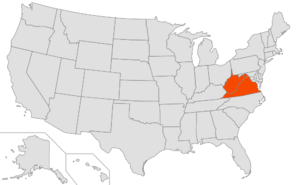Virginias facts for kids
Quick facts for kids
The Virginias
|
|
|---|---|
|
Region
|
|
 |
|
| Country | |
| State | |
| Principal cities |
List
|
| Area | |
| • Total | 67,004.97 sq mi (173,542.1 km2) |
| • Land | 63,528.30 sq mi (164,537.5 km2) |
| • Water | 3,476.67 sq mi (9,004.5 km2) |
| Population
(2019)
|
|
| • Total | 10,327,666 |
| • Density | 154.132835/sq mi (59.511020/km2) |
The Virginias is a region in the United States. It is made up of the states of Virginia and West Virginia. These two states used to be one until 1863. If they were still one state, they would be the 10th largest in the U.S. by population. In 2020, they had over 10.4 million people living there. The total area of both states is about 175,000 square kilometers (67,000 square miles).
Contents
Understanding the Virginias Region
The Virginias region includes two distinct states. These states share a long history together. They also have many natural features in common.
What Makes Up the Virginias?
The region is simply the combination of Virginia and West Virginia. Virginia is often called the "Old Dominion." West Virginia is known as the "Mountain State."
Key Cities in the Region
Many important cities are found in the Virginias. These cities are centers for business, culture, and education.
Major Cities in Virginia
- Alexandria: A historic city near Washington, D.C.
- Norfolk: A large port city with a naval base.
- Richmond: The capital city of Virginia.
- Roanoke: A city in the Blue Ridge Mountains.
- Virginia Beach: A popular coastal resort city.
Major Cities in West Virginia
- Charleston: The capital city of West Virginia.
- Huntington: A city along the Ohio River.
- Morgantown: Home to West Virginia University.
History of the Two Virginias
The area that is now Virginia was one of the first English colonies. West Virginia separated from Virginia during the American Civil War. This happened because of different views on important issues at the time.
How West Virginia Became a Separate State
During the Civil War, Virginia joined the Confederate States. However, many people in the western part of Virginia wanted to stay with the Union. They decided to form their own state. This new state was named West Virginia. It officially became a state in 1863.
Geography and Nature
The Virginias region has diverse landscapes. It includes coastal plains, rolling hills, and rugged mountains.
Mountains and Rivers
The Appalachian Mountains run through both states. This mountain range creates beautiful scenery. Many rivers also flow through the region. The James River and the Kanawha River are examples.
Climate and Environment
The climate varies across the region. Coastal areas have milder winters. Mountainous areas experience colder temperatures and more snow. The region is home to many forests and wildlife.
Economy and Industries
The economies of Virginia and West Virginia are different but also connected.
Virginia's Economy
Virginia has a diverse economy. It includes government jobs, technology, and military bases. Farming and manufacturing are also important.
West Virginia's Economy
West Virginia's economy has historically relied on coal mining. Today, it is working to grow other industries. These include tourism, chemicals, and energy.
Culture and Traditions
Both states have rich cultural histories. They share some traditions but also have unique customs.
The Virginias share a heritage rooted in early American history. This includes colonial architecture and historical sites.
Unique State Cultures
Virginia has a strong connection to its colonial past and coastal traditions. West Virginia's culture is deeply tied to its Appalachian mountain heritage. This includes folk music and crafts.
Images for kids
 | Delilah Pierce |
 | Gordon Parks |
 | Augusta Savage |
 | Charles Ethan Porter |


